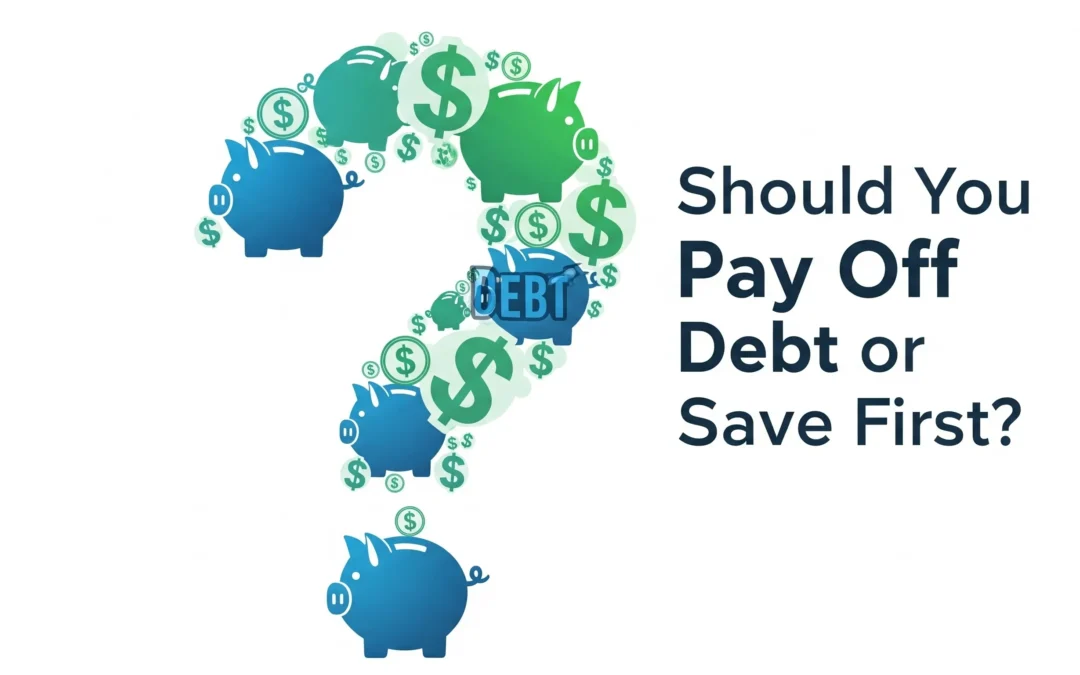Personal finance management sometimes seems like a battle between saving and paying off debt. Both are important for good money management, but understanding which requires priority will allow you to create a stronger financial foothold.
So, should you save first or pay off debt? Let’s dive into detail.
Understand Your Financial Situation First
Before making a financial decision, it is crucial to analyze your financial situation. You must have a clear picture of your present condition with focusing on all the factors affecting it. It is a subjective matter that requires analysis at an individual level.
Now you might be thinking, how to analyze your financial situation? Here are a few questions to do the same:
- How much am I indebted?
- What are the interest rates?
- How much emergency fund do I have?
- What is my monthly expenditure and income?
Let’s consider an example:
| Financial Factor | Value |
| Credit Card Debt | ₹1,50,000 @ 26% |
| Student Loan | ₹2,00,000 @ 11% |
| Emergency Savings | ₹20,000 |
| Monthly Income | ₹40,000 |
| Monthly Expenses | ₹30,000 |
Based on this example, we shall explore how different strategies—paying off debt versus saving—would impact financial health. Let’s examine both approaches to understand which might be more effective based on individual circumstances.
Case 1: Paying Off Debt First
1. High-Interest Debt Hollows Your Wealth
Unsecured high-interest debt, such as credit card balances, payday loans, or personal loans, is among the most harmful kinds of debt. If left unchecked, these frequently have interest rates of 20% to 40% or more, which can compound aggressively over time and make it nearly impossible to advance financially.
For instance, if you only make the minimum monthly payments on a credit card debt of ₹1,50,000 at 26% annual interest, it could take over a decade to repay the full amount, and you might end up paying more than ₹2,20,000 in interest alone—more than the original debt itself. This high-cost borrowing can silently drain your future savings and investment potential.
Therefore, paying off high-interest debt is like securing a guaranteed return on your money, often higher than what you’d earn from most investments. For example, eliminating debt with a 26% interest rate is effectively the same as earning a 26% return, but without any market risk. That’s why prioritizing the repayment of high-interest debt can be one of the most financially rewarding decisions you make.
2. Improved Credit Score
Paying off debt on time enhances your payment history and utilization rate—two key factors in your credit score. A superior score translates into lower loans down the line. Your credit score improves in two key areas when you make timely and responsible debt payments:
- Credit Utilization Ratio: This refers to the percentage of your available credit that you are currently using.
- Payment History: What is my payment history of making on-time payments?
There are practical advantages to this:
- Easier approval for auto or home loans.
- Better credit cards with benefits are available.
- Lower EMIs as a result of lower interest rates.
Case 2: Saving First
1. Create an Emergency Fund
Try building an emergency fund to save enough money for three to six months’ worth of necessities, including rent, groceries, utilities, EMIs, and transportation. During unanticipated circumstances like job loss, medical crises, or urgent home or auto repairs, this fund serves as a safety net.
When unforeseen expenses occur, you run a higher risk of getting into debt again if you don’t have an emergency fund. For instance, if your laptop breaks or you have an unexpected medical bill and no money saved up, you’ll probably take out a personal loan or swipe your credit card, reversing any debt repayment progress you’ve made.
2. Utilize Employer Benefits
Take full advantage of any benefits your employer may be offering, particularly if there is a company match, such as Provident Fund (PF) matching, National Pension Scheme (NPS) contributions, or gratuities. In essence, this is free money that can greatly increase your long-term savings.
Let’s say you make ₹50,000 a month and your employer matches 12% of your PF contributions. That’s ₹6,000 a month in free savings, or ₹72,000 annually, which grows tax-free over time. Ignoring such benefits to priorities debt repayment could mean losing out on tens of lakhs in long-term retirement savings.
In addition, many employers provide extra benefits like health insurance top-ups, performance-linked bonuses, or employee stock options (ESOPs), which can improve your cash flow and indirectly aid in debt repayment.
Should You Pay Off Debt or Save First?
Balance holds the key to the solution. Rather than choosing one, find the right balance based on your situation. Often, a hybrid strategy is most effective.
| Situation | Recommendation |
| Debt with high interest rates (>15%) | Focus on paying off debt first |
| Debt with low interest rates (<7%) | Priorities saving or investing |
| No emergency fund | Build a fund covering 3 – 6 months of essential expenses |
| Employer savings match available | Contribute to get a full match, then repay the debt. |
| Stable job and income | Split funds between debt and savings |
Bottomline
High-interest debt should usually be paid off first, but not at the expense of your financial stability. Before focusing on paying off debt aggressively, it’s important to prioritize establishing a small emergency fund. After you’ve paid off your debts, concentrate on making long-term investments and savings.
Save a little, make prudent debt payments, and lead a debt-free life.
Written by: Tanya Kumari


